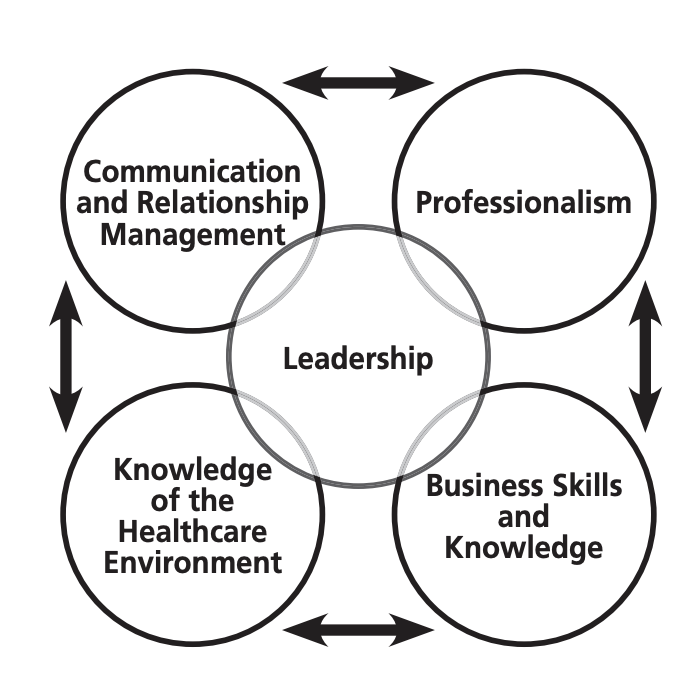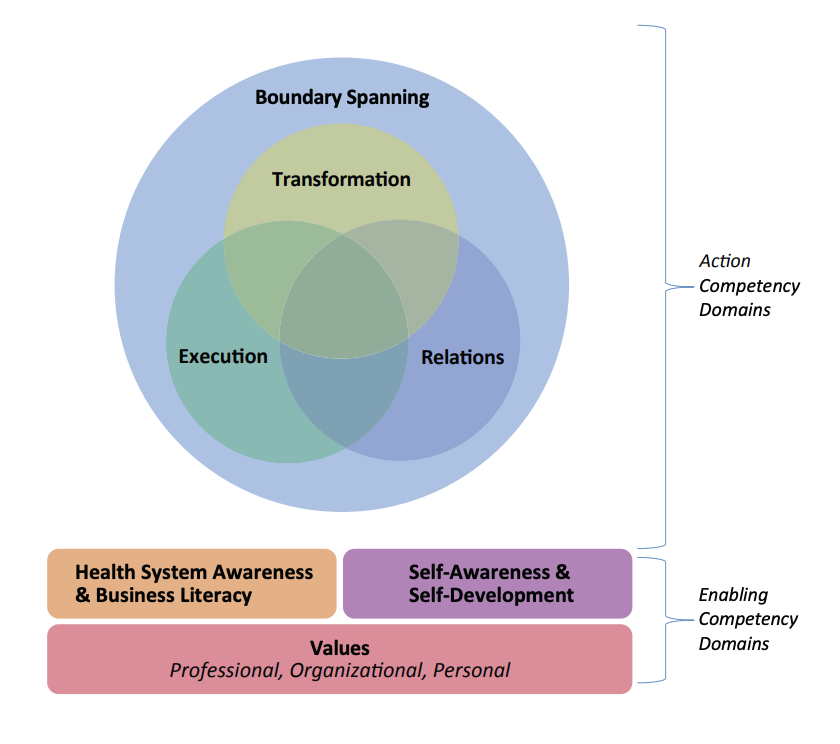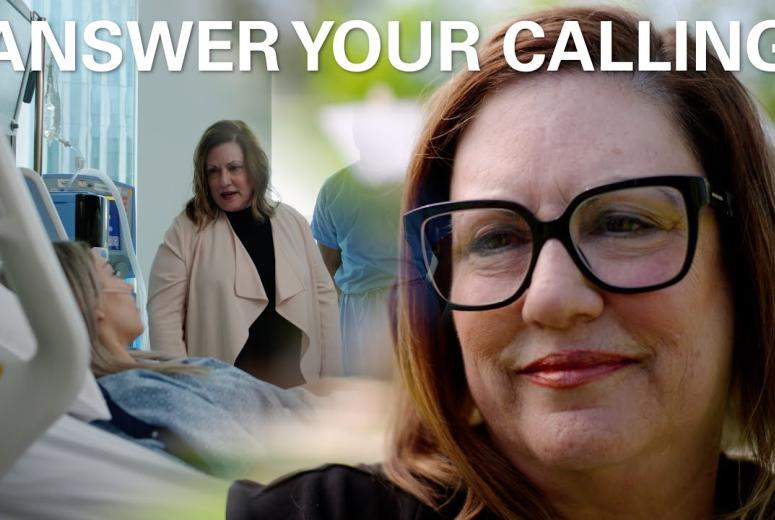Our program is built on twenty core competencies derived from the National Center for Healthcare Leadership (NCHL) and American College of Healthcare Executives (ACHE) competency frameworks. The curriculum is carefully sequenced so that students begin with foundational knowledge in healthcare systems, leadership, and financial management, then advance to applied learning in areas such as quality improvement, strategic planning, economics, quantitative methods, information management, and healthcare law. This progression ensures that graduates develop the full range of skills needed for effective healthcare leadership.
 |  |
| Source: American College of Healthcare Executives, ACHE Healthcare Executive 2025 Competencies Assessment Tool, Derived from HLA Model | Source: National Center for Healthcare Leadership, NCHL Health Leadership Competency Model 3.0, Figure 1, Health Leadership Competency Model 3.0 |
Domains, Program Learning Outcomes, and Competencies
I. Domain: Knowledge of the Healthcare Environment
1. Healthcare Issues and Trends. Utilize foundational knowledge of healthcare functions, stakeholders, and delivery systems to identify current healthcare issues and trends.
2. Population Health. Use quantitative and qualitative date (i.e., epidemiological, inequity, SES, demographic trends, and legislation) to assess the health of a community.
3. Healthcare Legal Principles. Describe the regulatory and legislative environment of the healthcare system.
4. Health Policy. Describe how health policy at the local, state, and federal levels impacts organizations.
PLO Population Health: Utilize population health frameworks that will improve health for groups, communities, and populations
II. Domain: Communication and Interpersonal Effectiveness
5. Writing Skills. Write professionally using relevant healthcare terms and concepts.
6. Presentation Skills. Present and speak dynamically to internal and external audiences.
7. Interpersonal Communication. Demonstrate the interpersonal skills necessary to build collaborative relationships.
8. Relationship Management. Display the ability to persuade others, while showing empathy, sense of belonging, and cultural competency.
PLO Communication: Apply effective oral and written communication to influence decision-making within a healthcare context.
III. Domain: Critical Thinking, Analysis and Problem Solving
9. Data Analytics. Acquire and analyze data to generate observations, trends, and recommendations.
10. Financial Management. Analyze financial and accounting information.
11. Information Technology. Use software and technology as decision-making tools to support organizational processes such as performance improvement and project management.
12. Critical Thinking and Innovation. Apply critical thinking and analysis to complex problems, developing creative and innovative solutions.
PLO Innovation: Apply multiple methods and sources to seek comprehensive information,
generate creative new solutions -or adapt previous solutions-and apply structured decision-making techniques and tools to address healthcare challenges.
PLO Strategic and Business Planning: Identify strategic priorities of a healthcare organization
and develop action plans and evaluation metrics to create and maintain a competitive advantage.
IV. Domain: Management and Leadership
13. Managing People. Describe and model key management and leadership principles and frameworks for managing, inspiring, and leading people.
14. Healthcare Management and Operations. Ability to plan, execute, and oversee projects in areas such as healthcare operations, risk management, continuous improvement, and information management.
15. Leadership. Examine leadership styles that encourage decision-making and solutions while fostering a sense of purpose, motivation, and trust for self and other stakeholders.
16. Wholeness. Establishes habits promoting wholeness and advocates for a climate supportive of the total health of oneself and others.
17. Strategic Orientation. Conduct environmental scanning to formulate strategies for long-term success and apply change management tools to garner commitment to changes in approaches, processes, and strategies.
V. Domain: Professionalism and Ethics
18. Healthcare Personal and Professional Ethics. Articulate and evaluate professional values and ethics, demonstrating an understanding of administration from a faith-based perspective.
19. Professionalism. Promote adherence to professional and ethical standards and norms through assessment and reflection.
20. Working in Teams. Demonstrate the ability to work as a team member and to support and value diverse opinions and perspectives.
PLO Faith and Ethics: Evaluate managerial and leadership challenges in healthcare using an ethical, faith-based framework







